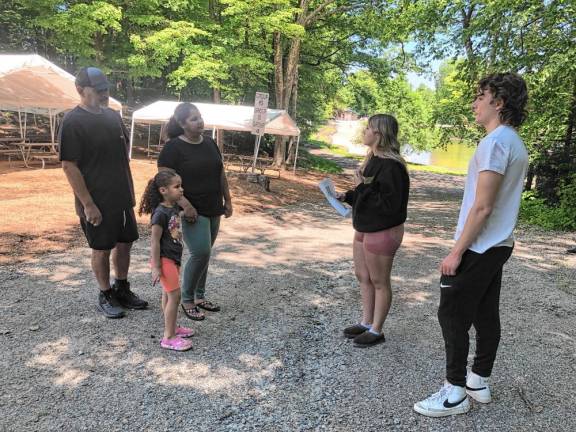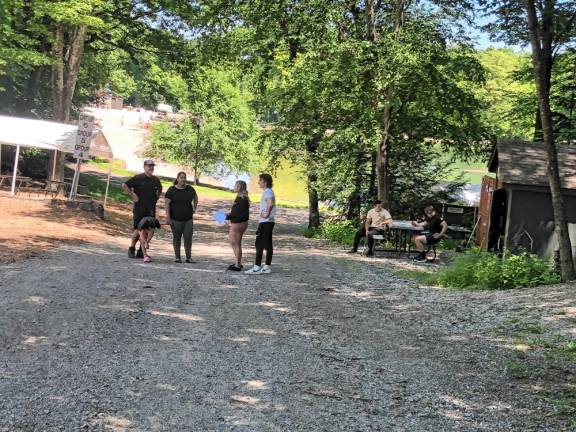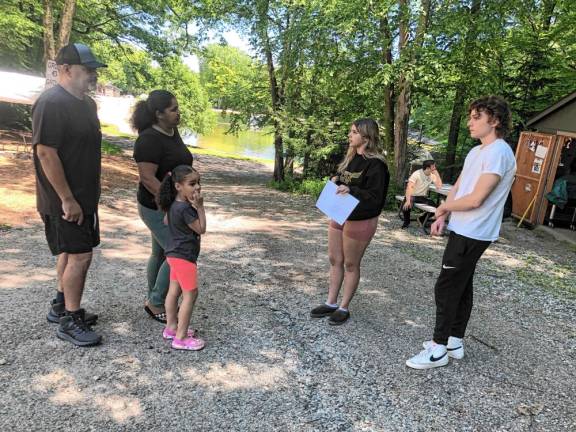Summer day camps juggle high costs, low enrollment
RECREATION. While some local camps didn’t garner enough interest to continue this summer, others have grown with new family offerings.




As summer begins, many parents turn to day camps operated by their municipality’s Parks and Recreation Department for activities and child care at a cost that is typically lower than that of privately run camps.
Because of the high cost of operating summer camps and the impact of the COVID-19 pandemic on enrollment, the options accessible to working parents may look different from years past.
For the second year in a row, Chester, N.Y., will not operate its day camp because of low enrollment.
The town was hoping to have at least 50 children enrolled in each of the six sessions, said Town Supervisor Brandon Holdridge.
For one session, 14 were enrolled. For others, there were only one or two and a few of the sessions had no registered campers, said Michelle Deshler, Chester’s recreation coordinator.
“We just didn’t have the kids to justify the camp,” Holdridge said.
After the program closed during the pandemic, Chester tried to alter its offerings to fit within the Health Department’s guidelines, but there was not enough interest in a fully outdoor program.
Facing the same problem last year, Chester Parks and Rec held roundtable discussions with parents to see what could be done to boost enrollment.
“We really did a lot different this year to try to conform to what parents were looking for in order to prevent that,” Holdridge said. “But unfortunately, we didn’t have the numbers again this year.”
For example, parents requested that the camp be partially indoors, so the town partnered with the school district, Holdridge said.
The Sparta, N.J., Parks and Recreation Department operates Camp Sacajawea. Its staff does everything from ordering supplies to navigating state licensing to hiring staff and camp directors who run the camp throughout the summer, said program coordinator Alison Deeney.
Camp Sacajawea ran in a modified format during summer 2020, adhering to state guidelines by shrinking group sizes and eliminating camp-wide events, she said.
“We felt that it was really important for kids to still be able to have the camp experience that summer.”
Deeney said the camp has returned to its pre-pandemic form, with good enrollment, field trips and large group events.
For the summer day camp in Tuxedo, N.Y., registration is slow but ahead of where it was last year at this time, camp director Kathleen Metcalf said.
People wait to register their children for a number of reasons, such as waiting for a paycheck, she said.
“I think a lot of people wait until the last minute because they know this camp is always here and there’s room so we don’t turn people away.”
However, last-minute registration means a waiting list for people hoping to work as counselors, which Metcalf said is “a good problem to have.” “I would like to tell these (counselors) they have a job, but I have to wait for the numbers.”
Flora McClellan, who has been director of Bubbling Springs Day Camp in West Milford for the past 10 years, said enrollment is not a problem there.
The camp can accept up to 30 children in each of its eight sections, which are divided according to the child’s grade in the fall. The youngest campers will be entering kindergarten. The oldest group, for seventh- and eighth-graders, is called Teen Camp, which has somewhat different activities than those for the younger campers.
While some sections had as many as 35 campers before the pandemic, the numbers have not exceeded 30 in a section in recent years.
”We average between 150 and 180 (campers) a week,” McClellan said.
While finding staff was “very tough” last year, she has plenty of applicants for this summer.
The camp hires about 30 counselors as well as a nurse, bus driver, music coordinator, art coordinator, sports coordinator and special events coordinator.
Working parents
Deeney estimates that half of the campers at Sparta’s Camp Sacajawea are enrolled because their parents are working.
Camp Sacajawea runs from 8:30 a.m. to 3 p.m., with extended hours available at an extra charge to accommodate working parents.
Early drop-off at 8 a.m. costs $15 a day, and late pickup at 5 p.m. costs $40 a day.
“They can do one or the other or both depending on what they need for their working schedule,” Deeney said.
Sparta residents register for the camp first, then those from other towns may fill the remaining spots.
At the Tuxedo camp, there is no late pickup option. The camp ends at 3:30 p.m. There is early drop-off at 8 a.m. for no extra charge, although Metcalf said fewer families use it than one would expect.
“I don’t know if that affects our attendance, but we had a full house last year and we’re hoping for the same this year,” she said.
Bubbling Springs’ camp day runs from 9 a.m. to 4 p.m. with early drop-off starting at 7 a.m. and late pickup until 6 p.m.
Parents typically pay $51 extra for early drop-off and an additional $51 for late pickup after June 1 and $41 each before that date.
In Chester Parks and Rec’s Facebook post announcing the camp cancellation this year, several parents commented that the hours were not accommodating for working parents. The camp was going to run from 8:30 a.m. to 2 p.m., meaning parents who work 9-to-5 jobs would have no way to pick up their children on time.
Parents voiced this concern at the discussions that went into planning the program, but Holdridge said he was unable to extend the hours because of the small budget allocated to the camp.
In lieu of day camp, Chester Parks and Recreation will hold field trips and events for children throughout the summer. Holdridge said there has been an internal planning session for next year’s day camp, and he plans to hold another roundtable with parents.
“We are committed to trying to make it work again next year, but if it doesn’t work again next year, then we are going to have to move on from it and adapt with the times,” he said.
Camp tuition
In Sparta, Camp Sacajawea costs $235 a week, Deeney said, and runs for six weeks (July 1-Aug. 9). Tuition has increased slightly during the past few years because the camp’s cost to families is directly determined by the program’s operating costs.
“All we’re trying to do is cover our operating expenses. We’re not trying to make money on the program,” she said.
The biggest expenses to run Sparta’s camp are renting Camp Sacajawea and portable toilets and covering personnel costs, such as salaries, uniforms, background checks and certifications.
Another big expense is the weekly special events that Camp Sacajawea offers at no additional cost to families. Special events this year will include a reptile show, a magic show, laser tag and a carnival day with a petting zoo, inflatable slide, cotton candy and snow cones.
The camp also runs field trips, which do cost extra. Campers who don’t go on a field trip have a normal camp day. A typical day at Camp Sacajawea includes games, arts and crafts, biking, archery and time at the waterfront.
“Children are encouraged to unplug and enjoy the outdoors,” Deeney said.
After June 1, the West Milford day camp costs $257 for each one-week session except for the first week, which is only four days and costs $206. There are seven sessions from July 1 through Aug. 16.
The prices were $242 and $194, respectively, until June 1. The cost is reduced by $25 for each additional sibling enrolled.
Campers who paid for all seven sessions before April 15 received a 10 percent discount.
McClellan said staff members research the costs of other nearby camps. “We’re pretty cheap. ... You couldn’t pay a babysitter for as cheap as you can come here.”
In Chester, the camp would have run from July 1 to Aug. 5.
After parents said the cost of the camp was too high, the town cut tuition from about $230 to about $190 by cutting some of the programs that were offered previously, Holdridge said.
“I wanted to be able to bring down the cost more, but it’s just the budgetary constraint that was left for me by the previous supervisor,” he said.
Holdridge will have more influence over the upcoming budget as a supervisor, and he plans to try to budget more money for the camp to bring the cost down further.
“If we can subsidize the camp more with tax money, then we can ultimately make it cost less for the parents who want to sign up,” he said. “That’s how I believe other towns are able to bring down their costs so much.”
That is the case in Tuxedo, where the fee is determined based on operating costs and the town supplements part of the cost of running the camp, Metcalf said. This helps keep costs down for families, she said.
For the whole season, Tuxedo’s camp costs $700 for residents of the town and $800 for nonresidents, equivalent to about $140 a week for residents and $160 a week for nonresidents. It runs from July 8 to Aug. 9. There is a $100 sibling discount.
Metcalf said the camp’s largest expenses for Metcalf are staffing and bus transportation for campers between the school and the lake as well as to and from day trips.
The state requires an eight-to-one or six-to-one ratio of campers to counselors, depending on the campers’ age.
Metcalf said she tends to overstaff the camp, with about a six-to-one ratio for all ages plus many counselors in training. The camp includes children entering kindergarten in the fall, and the younger campers require more attention, she said.
“Staffing is obviously the biggest part of the budget.”
Other costs include bringing in performers, hiring an arts and crafts instructor, and maintaining or replacing equipment each year.
The cost did not increase this year, and it previously increased about $50. The increase in cost reflects an increase in value, she said.
Last year, Metcalf brought in a magician. This year, day trips during the week to a Boulders game and a bounce trampoline park will be included in the regular cost.
“Bigger and better every year is my goal,” she said.
Kathy Shwiff contributed to this article.